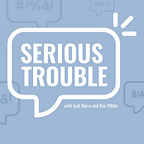Dear listeners,
When Sara, Ken and I discussed when to record this week’s episode, we were concerned about when a new federal indictment of Donald Trump might drop. Naturally, one dropped literally minutes after we finished our recording session — but not the one we’d been preparing for.
A federal grand jury in south Florida has issued a superseding indictment in the documents case, which adds new charges, some new amusing color about security cameras, and a new defendant: Carlos De Oliveira, a former car valet who had been promoted to head the maintenance department at Mar-a-Lago, and who prosecutors say conspired (unsuccessfully) with Trump and Walt Nauta to delete incriminating surveillance footage at the club.
So, we re-started the recording to produce a superseding opening segment to this week’s podcast (while preserving our original episode opening, for transparency and for your amusement). We talked about how the revisions to the charges will affect the case and its timing — earlier this week, Judge Aileen Cannon proposed a trial date in May, which Ken thinks was, if anything, a little aggressively fast given the nature of the case. Adding De Oliveira as a defendant will modestly delay matters, and other delays related to pre-trial motions and appeals were already likely, and that all means it’s fairly likely we’ll end up with a trial that starts after the election even if Judge Cannon doesn’t do any weird shenanigans.
Meanwhile, in indictments that didn’t happen: Trump hasn’t been indicted in the January 6-related case for which he received a target letter over the weekend, but an imminent indictment is likely, quite possibly next week. And Hunter Biden didn’t get indicted on Wednesday even though he wanted to be, because his attorneys and the government didn’t agree on the meaning of the convoluted plea and diversion agreements they had negotiated. Most importantly, they didn’t have the same view on what Hunter was being promised: Was he going to avoid prosecution for any tax and gun crimes other than the two tax misdemeanors he would plead guilty to, or was the government promising not to prosecute him for any matter related to the foreign employment that had generated the income on which he initially did not pay taxes?
Judge Maryellen Noreika sent the parties back to the table to work out an agreement that will hopefully be clearer and less oddly structured than the one they brought to her this time around. And I expressed my befuddlement to Ken: How did all these fancy lawyers, working on a case they all knew would draw tremendous media attention and be an enormous political football, make a series of mutual errors and produce a vague agreement they didn’t really understand? Honestly, I’m still not sure I get how that happened. It looks likely that Judge Noreika will ultimately approve the plea if the government and Hunter come to terms — but if they both decide they really are wedded to the approach they expected on non-prosecution, then this thing could head to an unexpected trial.
Oh! And Sam Bankman-Fried. He’s in trouble again. The Feds want to send him to await trial in jail, since they say he’s been trying to indirectly intimidate a witness (Caroline Ellison, his co-conspirator and ex-girlfriend) by trash-talking her to reporters. I have an idea that seems simpler than putting him in jail: since he lives in his parents’ house, and he must stay there in order to stay out of jail, why don’t they — Barbara Fried and Joseph Bankman — put him on punishment, so he’ll stop calling The New York Times? Judge Lewis Kaplan has imposed a constitutionally dubious gag order on SBF, but there’s nothing in the Constitution that says your mom can’t take away your cell phone while you’re living under her roof.
We hope you enjoy the episode.
Very seriously,
Josh







